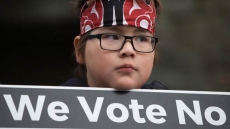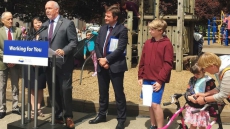TORONTO — Long-term Canadian expats are set to find out on Friday whether a 25-year-old law barring them from voting in federal elections is constitutional.
The pending decision by the Supreme Court of Canada should settle a legal battle begun in earnest during the former Conservative government of then-prime minister Stephen Harper, and which gained prominence in the election that brought the Liberals under Justin Trudeau to office.
Observers said they would be watching to see whether the country's top court might justify limits on a constitutionally guaranteed right that potentially affects more than one-million Canadians who live abroad.
"What makes this case so interesting is that the Constitution sets no limits on citizen's voting rights, so does that mean legislatures get to impose one?" Toronto-based lawyer Andrew Bernstein said on Thursday. "Do the reasons why someone has moved make a difference? How strict will the court be when the government seeks to justify an infringement?"
While the Constitution guarantees all Canadian citizens the right to vote, Canadians who have lived abroad for five years or more lose that right under provisions of the Canada Elections Act enacted in 1993. However, it was only under Harper that Elections Canada began enforcing the provisions more strictly, prompting the court battle.

Two long-time expats living and working in the United States launched the charter challenge after they were denied the right to vote in the 2011 federal election.
Essentially, Jamie Duong, of Ithaca, N.Y., and Gill Frank, 40, an academic living in Richmond, Va., argued nothing warranted the abridgement of their constitutional right to vote. They insisted they maintain deep ties to Canada, and taxes and other laws passed by Parliament could still affect them.
For its part, the government maintained the rules were reasonable and fair to Canadians living in Canada, who are more directly impacted by what goes on in Ottawa.
The case, which garnered attention from civil liberties groups, initially went in favour of Duong and Frank when an Ontario Superior Court justice sided with them in 2014. However, the federal government appealed and in a split decision in 2015, the Ontario Court of Appeal overturned the earlier ruling, paving the way for the current Supreme Court tussle.
While the Appeal Court agreed the law infringed on the rights of citizens, the majority found the infringement was justified in a democracy because the rules preserve the "social contract" between voters and lawmakers.

In arguments before the Supreme Court, the government noted almost all Canadians living abroad were barred from voting before the 1993 law changes. Ottawa also argued the five-year rule was a policy decision that aimed to maintain the fairness of the democratic system given that long-term non-residents have "different and less onerous responsibilities" under Canadian law.
The expats responded by calling the five-year threshold an arbitrary marker that did not take into account their ongoing connection to Canada.
In the 2015 election, celebrities such as Donald Sutherland, Canadian business groups abroad and other expats rallied against Harper and the expat voting ban.
The campaigning Liberals promised a review and the Trudeau government, which faces an election campaign in October, introduced legislation in November 2016 to extend the franchise to all Canadians abroad. The legislation never got beyond introduction despite government claims it was a priority.
The issue, Frank has said, is that voting rights should not be "subject to the political whims of Parliament."


